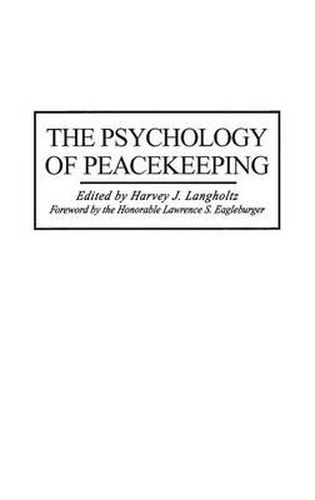Readings Newsletter
Become a Readings Member to make your shopping experience even easier.
Sign in or sign up for free!
You’re not far away from qualifying for FREE standard shipping within Australia
You’ve qualified for FREE standard shipping within Australia
The cart is loading…






Langholtz examines how psychology and other social sciences can offer both theoretical explanations and practical applications in the resolution and amelioration of potentially violent international conflicts. Since the end of the Cold War and bipolar ideologies, the international community has been willing to intervene using approaches that are founded as much in psychology as in force and these remedies have not been confined to the violent periods of conflicts. This book examines psychological interventions and issues during three phases of conflicts. First, the book examines measures available in advance of a threatening conflict through early intervention and an examination of ethnopolitical issues, economic problems, and potential diplomatic solutions. Second, psychological facets of peacekeeping are examined: the selection of peacekeepers, psychological ambiguities of peacekeeping, and the numbing that comes with widespread suffering. Finally the book examines the psychological measures available to strengthen a cease-fire, deal with mines and related after-effects of war, encourage reconciliation, and hasten the return to a stable and durable peace.
$9.00 standard shipping within Australia
FREE standard shipping within Australia for orders over $100.00
Express & International shipping calculated at checkout
Langholtz examines how psychology and other social sciences can offer both theoretical explanations and practical applications in the resolution and amelioration of potentially violent international conflicts. Since the end of the Cold War and bipolar ideologies, the international community has been willing to intervene using approaches that are founded as much in psychology as in force and these remedies have not been confined to the violent periods of conflicts. This book examines psychological interventions and issues during three phases of conflicts. First, the book examines measures available in advance of a threatening conflict through early intervention and an examination of ethnopolitical issues, economic problems, and potential diplomatic solutions. Second, psychological facets of peacekeeping are examined: the selection of peacekeepers, psychological ambiguities of peacekeeping, and the numbing that comes with widespread suffering. Finally the book examines the psychological measures available to strengthen a cease-fire, deal with mines and related after-effects of war, encourage reconciliation, and hasten the return to a stable and durable peace.